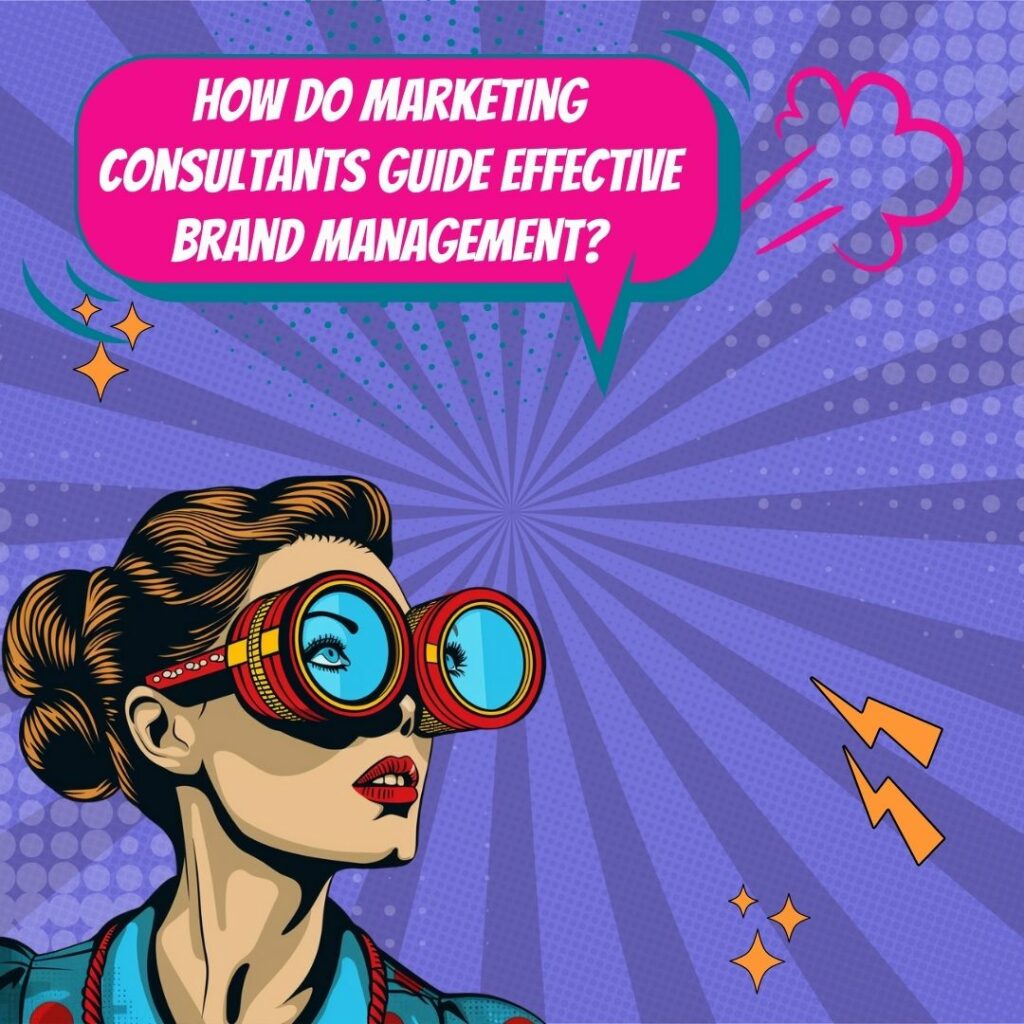Key Takeaways
✅ Marketing Consultants Help Define and Refine Your Brand Identity: They conduct in-depth market research to align your brand's values, mission, and unique selling proposition with consumer expectations. This helps create a consistent message, which builds trust and loyalty.
✅ Marketing Consultants Develop Data-Driven Strategies for Growth: They leverage analytics to optimize marketing efforts, improving your return on investment. From SEO audits to content strategy, these experts ensure your marketing campaigns are as effective as possible.
✅ Marketing Consultants Provide Objective Expertise and Accountability: They offer an unbiased perspective on your marketing initiatives, setting and tracking Key Performance Indicators (KPIs) to measure success and drive continuous improvement.
 Introduction
Introduction
Effective brand management is crucial for businesses looking to stand out in today's competitive marketplace. Marketing consultants play a vital role in guiding companies through the complexities of brand management and growth. With their specialized knowledge and strategic insights, these experts help businesses develop and implement comprehensive brand strategies that resonate with their target audience. By focusing on key elements such as brand identity, positioning, and communication, marketing consultants ensure that every aspect of a company's brand is aligned with its overall goals and values.
Marketing consultants bring a wealth of experience and innovative thinking to the table, enabling businesses to navigate the ever-evolving landscape of digital marketing. They provide tailored solutions that address specific challenges and opportunities, helping brands to not only survive but thrive. From enhancing brand visibility through targeted campaigns to leveraging data analytics for informed decision-making, marketing consultants offer a holistic approach to brand management. This ensures that businesses can build strong, lasting relationships with their customers, ultimately driving sustained growth and success.
Top Statistics
| Statistic | Insight |
|---|---|
| Global Market Size (2021): The global marketing consulting market size was valued at USD 22.32 billion in 2021. | This initial valuation sets a baseline for understanding the significant economic footprint of the marketing consulting industry. |
| Global Market Size (2023): The global marketing consulting market size was valued at USD 23,169.9 million in 2023. | A steady growth, indicating the rising demand for marketing consultants as businesses seek expertise in expanding their market presence. |
| Global Market Size (2027): The global marketing consulting market size is expected to reach USD 28,048.14 million by 2027. | Forecasting a robust growth trajectory, revealing the long-term value of effective brand management strategies. |
| US Market Size (2024): The market size of the Marketing Consultants industry in the US is $87.7 billion in 2024. | Reflects the massive share held by the US market, which signifies immense opportunities for local and international consultants. |
| Industry Employment (2024): The Marketing Consultants industry in the US has approximately 87,000 employees in 2024. | A high employment figure suggesting that the demand for marketing talents remains robust, potentially prompting more individuals to explore careers in this field. |
What Does a Marketing Consultant Do?
A marketing consultant is a professional who helps companies craft and manage their marketing efforts. They develop plans to re-brand, create marketing campaigns, boost customer engagement, and more. By bringing in specialized knowledge, they aid businesses in achieving their marketing goals more effectively and efficiently. But what exactly does their role entail? They not only analyze market trends and consumer behavior but also provide insights on the latest tools and technologies to enhance marketing efforts. Additionally, they offer training and support to internal marketing teams, ensuring the strategies are well-executed and maintained.
Core Responsibilities of a Marketing Consultant
Marketing consultants start by assessing current marketing strategies to identify strengths and weaknesses. They then develop new strategies that align with business objectives. Creating and implementing marketing campaigns is essential; these campaigns often involve crafting communications plans. Consultants analyze customer feedback, gauging the success of these initiatives. Staying current with industry trends is vital. Proposals for fresh marketing strategies are developed to keep your business ahead of competitors. Working closely with clients ensures their needs are met, while collaboration with designers and other external consultants ensures a cohesive brand image. They also conduct market research to understand the competitive landscape and identify opportunities for differentiation. Monitoring campaign performance and adjusting tactics based on data analysis ensures continuous improvement. Lastly, they provide detailed reports and actionable recommendations to help businesses make informed decisions.
Crafting a Branding Strategy
Developing a strong branding strategy is pivotal. A consultant crafts a comprehensive plan that sets your business apart from others in your industry. They identify target audiences and devise plans to effectively reach them. Visual branding should reflect your business values. Messaging needs to resonate with your audience, building a website that serves as your digital storefront. Establishing an online presence through social media and search engine optimization helps maintain visibility in an increasingly digital world. They ensure that all branding efforts are consistent across various platforms and materials. By creating a unique brand voice, they help businesses connect emotionally with their audience. Additionally, they might conduct brand audits to assess brand perception and make necessary adjustments.
Implementing Marketing Campaigns
Tailoring a marketing strategy to your target market is the first step in any campaign. Creating engaging content keeps the audience tuned in. Running these campaigns and tracking their effectiveness ensures they are on the right track. Diversifying the outlets through which content is distributed maximizes reach and impact, making sure the message reaches the desired audience in the most effective way. Consultants also utilize data analytics to measure campaign performance and make data-driven decisions. They experiment with different formats and channels to find the most effective combination. Ongoing optimization and testing help refine the campaigns for better results over time.
The Importance of Brand Management
Brand management consultants refine and adjust strategies to keep the brand optimized in the market. They guide firms on developing and maintaining a strong, unique brand that sticks with consumers. Ensuring consistency and integrity across various brand touchpoints is crucial. Monitoring consumer sentiments and market trends helps in adapting strategies, keeping the brand relevant in a dynamic market landscape. They also conduct competitor analysis to understand market positioning better. Regular brand audits and feedback loops help identify areas for improvement. By fostering a strong brand culture internally, they ensure that employees also become brand ambassadors.
Selecting the Right Marketing Consulting Firm
Finding the right consulting firm involves careful research. Check their experience, skills, and reputation. References provide insight into their track record and customer satisfaction. Clearly setting objectives ensures that both parties are aligned in terms of expectations. Ask pivotal questions to confirm they truly understand your business and have a solid plan to help you reach your goals. Look for a firm that offers a comprehensive range of services and has experience in your specific industry. Evaluate their strategic approach and ensure they prioritize measurable results. Building a strong partnership with open communication and mutual trust is key to achieving success.
Understanding the multifaceted role of a marketing consultant can help businesses take informed steps toward successful marketing strategies. Whether refining existing approaches or launching entirely new ones, these professionals offer invaluable expertise. They bring a fresh perspective and innovative ideas to the table, ensuring that businesses stay ahead of the competition. By leveraging their knowledge and experience, companies can enhance their marketing efforts, drive growth, and achieve their business objectives.
AI Marketing Engineers Recommendation
Recommendation 1: Leverage Personalization Through Marketing Consultants: Understanding the power of personalization in marketing cannot be underestimated. According to a study by Epsilon, 80% of consumers are more likely to make a purchase when brands offer personalized experiences. Marketing consultants can help businesses create detailed customer personas, aiding in the development of targeted and relevant marketing campaigns. By analyzing customer data, they can recommend personalized content, thereby increasing engagement and conversion rates. Personalization can include tailored email campaigns, product recommendations, and customized website experiences, all designed to make each customer feel valued and understood. This approach not only enhances customer satisfaction but also builds long-term loyalty and drives repeat business.
Recommendation 2: Adopt Omnichannel Strategies with Expert Guidance: In today's digitally saturated market, omnichannel strategies are not just optional but essential. Data from the Harvard Business Review reveals that 73% of shoppers use multiple channels during their buying journey. Marketing consultants specializing in brand management can devise comprehensive omnichannel strategies that ensure consistent messaging across all platforms. This unified approach not only enhances customer experience but also strengthens brand loyalty. By integrating online and offline channels, businesses can provide seamless interactions, whether customers are shopping on a website, browsing social media, or visiting a physical store. Marketing consultants can also help in tracking customer interactions across channels, providing insights to optimize the customer journey and drive conversions.
Recommendation 3: Utilize AI and Data Analytics Tools for Informed Decisions: AI and data analytics play a crucial role in modern marketing strategies. A report by Forrester indicates that companies using AI for marketing grow at least 30% faster than those not leveraging AI. Marketing consultants equipped with AI tools can provide actionable insights by analyzing large datasets, identifying trends, and predicting customer behavior. Tools like Google Analytics, HubSpot, and IBM Watson can help consultants deliver precise recommendations, improving decision-making and driving growth. By leveraging AI, businesses can automate routine tasks, personalize customer interactions, and optimize marketing campaigns in real-time. This data-driven approach ensures that marketing efforts are both efficient and effective, leading to higher ROI and sustained business growth.
Relevant Links
- Revolutionize Your Marketing with AiMarketingEngineers.com
- Set Impactful Campaign Goals and Marketing Objectives
- Master Market Penetration with Campaign Reach and Audience Size Strategies
- Boost Customer Engagement with Personalized Advertising
Conclusion
In the evolving landscape of business, the role of a marketing consultant remains integral to achieving effective brand management and growth. These professionals not only devise comprehensive strategies but also ensure your marketing efforts resonate with today's savvy consumers. From crafting branding initiatives and running marketing campaigns to maintaining a consistent brand image across all touchpoints, marketing consultants are the cornerstone of modern marketing success.
Key responsibilities like assessing current strategies, developing new plans, and staying updated with industry trends underscore the multifaceted nature of their work. Effective brand management, an essential service they provide, involves everything from identifying target audiences to developing compelling messaging and a strong online presence. Marketing campaigns tailored to specific markets and tracked for their effectiveness can yield significant returns.
Choosing the right marketing consulting firm is pivotal. Thorough research and clear communication of objectives can lead to a partnership that propels your brand forward. As businesses strive to stay relevant in a competitive market, the expertise of a marketing consultant could be the catalyst for significant growth and enhanced brand identity. Aim to leverage this guide to make informed decisions and take the bold step toward refining your brand with professionalism and strategic insight.
FAQs
Question 1: What is a marketing consultant?
Answer: A marketing consultant is an experienced professional who advises companies on marketing decisions based on research and experience. They can be freelancers or part of a team, specializing in various areas of marketing.
Question 2: Why hire a marketing consultant?
Answer: Hiring a marketing consultant provides an external perspective, helping to overcome internal biases and assumptions. They offer flexibility, as services can be scaled up or down as needed, and can provide expertise without the need for a full-time employee.
Question 3: What is the job description for a marketing consultant?
Answer: The job description varies, but typically includes analyzing and assessing marketing strategies, making recommendations, and supporting implementation. They may work on strategy, implementation, or both, depending on client needs.
Question 4: What should I expect from a marketing consultant?
Answer: A marketing consultant should quickly understand your business, ask many questions, and request data to formulate a marketing strategy. They should provide clear recommendations and measurable outputs.
Question 5: How involved do I need to be?
Answer: The level of involvement depends on the client's preferences, available time, and budget. The consultant will decide how much input is needed after the initial briefing and onboarding process.
Question 6: What is a marketing strategy?
Answer: A marketing strategy is a company's blueprint, outlining its vision, target audience, and goals. It serves as a guide for all marketing efforts.
Question 7: Do I need a marketing strategy?
Answer: Ideally, all businesses need a marketing strategy to ensure a clear direction and effective use of resources.
Question 8: What is the difference between a marketing strategy and a marketing plan?
Answer: A marketing strategy sets out the company's vision and goals, while a marketing plan outlines the specific actions to achieve those goals.
Question 9: How long does it take to create a marketing strategy or plan?
Answer: The time required varies depending on the scope and complexity of the project, but typically ranges from a few weeks to several months.
Question 10: How do you measure marketing success?
Answer: Marketing success is measured using key performance indicators (KPIs) such as ROI, conversion rates, bounce rates, and customer satisfaction. The specific metrics used depend on the client's goals and objectives.
Academic References
- Laitinen, K., & Töytäri, P. (2016). "The Role of Marketing Consultants in the Development of Marketing Strategy: An Exploratory Study." Journal of Business Economics and Management, 17(6), 1114-1130. This study emphasizes the expertise of marketing consultants in market analysis, competitive intelligence, and strategic planning.
- Laitinen, K., & Töytäri, P. (2018). "The Role of Marketing Consultants in Strategic Marketing Decision-making Processes." Journal of Business Economics and Management, 19(1), 1-19. This article highlights the importance of marketing consultants in strategic decision-making, focusing on their expertise in analyzing markets, developing strategies, and providing independent advice.
- Martinez-Garcia, M. L., et al. (2016). "Marketing Consultancy Services: Exploring the Role of Relational Factors in Client Satisfaction." European Journal of Marketing, 50(3/4), 467-490. This study explores the significance of relational factors, such as communication, trust, and commitment, in client satisfaction with marketing consultancy services.
- König, A., & Jacobsen, M. (2017). "Professional Service Firms and Market Knowledge: The Contribution of External Experts." Industrial Marketing Management, 63, 17-26. This paper discusses the contribution of external experts, particularly marketing consultants, in helping professional service firms develop market knowledge.
- Fernqvist, S., et al. (2017). "The Role of Marketing Consultants in the Development of Marketing Capabilities." Journal of Business Research, 79, 14-22. This study examines the role of marketing consultants in developing marketing capabilities, emphasizing the importance of their expertise in creating value for clients.
- Ojasalo, J., et al. (2017). "The Role of Marketing Consultants in the Internationalization Process of Small and Medium-Sized Enterprises." Journal of Small Business Management, 55(1), 170-195. This article explores the role of marketing consultants in the internationalization process of small and medium-sized enterprises, focusing on their contributions to market entry strategies and market knowledge.
- Hult, T. M., et al. (2006). "Marketing Consultants and the Diffusion of Innovations: An Exploratory Study." Journal of Business & Industrial Marketing, 21(6), 381-388. This study investigates the role of marketing consultants in the diffusion of innovations, highlighting their contributions to marketing strategy development and implementation.
- Peterson, R. A., & Kerin, R. A. (1980). "The Effective Use of Marketing Research Consultants." Industrial Marketing Management, 9, 69-73. This article discusses the effective use of marketing research consultants, emphasizing the importance of proper problem definition, familiarity with research methods, and continuous communication between buyer and seller.












